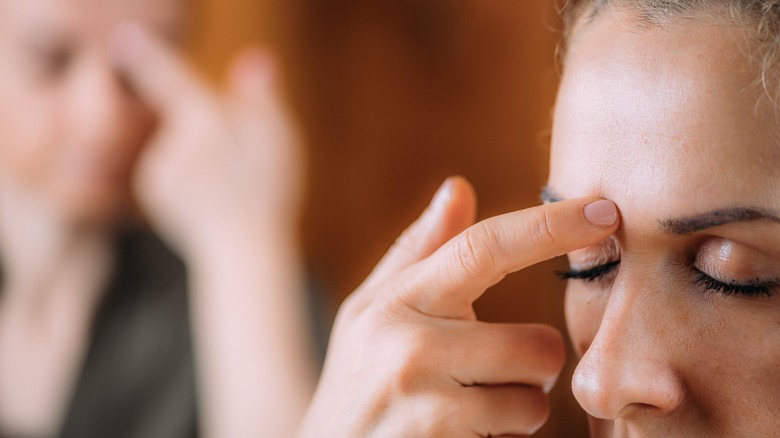EFT Tapping Is The Meditation Technique That Can Help Your Anxiety
Part of being alive is experiencing anxiety. Worry or fear of what might happen in any given situation is something that happens to all of us. It's not always necessarily a bad thing. Being anxious about something can spur you into action and provide motivation. But it's still not a good feeling, and it can definitely become problematic if your feelings of anxiety are preventing you from living your life or if you have feelings of anxiety without any specific stressor that's causing it. Some 40 million people in the United States, nearly 20% of the population, have anxiety disorders, according to the Anxiety & Depression Association of America.
Anxiety can have physical manifestations if it's strong enough. When you're anxious all day, it can take a toll on your body. Your heart may start to beat faster, your breathing may become quicker, and you may have butterflies in your stomach. It causes a rise in the cortisol levels in your body, and it can leave you unable to relax, concentrate, or get good sleep, per NHS. Long-term anxiety can lead to problems like a weakened immune system, high blood pressure, and cardiovascular disease, says Healthline. But thankfully, there are ways you can help reduce your anxiety, and EFT tapping is one of those ways.
If you or someone you know needs help with mental health, please contact the Crisis Text Line by texting HOME to 741741, call the National Alliance on Mental Illness helpline at 1-800-950-NAMI (6264), or visit the National Institute of Mental Health website.
EFT tapping combines theories from acupressure and psychology
Developed by Stanford mechanical engineering graduate Gary Craig in the 1990s, EFT stands for "emotional freedom technique." The technique is referred to sometimes as just EFT, sometimes as just tapping, and sometimes as EFT tapping. It's rooted in ideas of Chinese acupressure and cognitive behavioral therapy, and the goal is to reduce stress and anxiety.
One of the great things about it is that you can do it yourself. Choose a quiet room where you can be alone. The basics of the technique are to focus on something stressful or anxiety-producing in your life as you tap on certain points of your body to help calm your emotional reaction to the issue, per St. Luke's. More specifically, it starts by you determining how distressed you feel about the particular situation, on a scale of zero to 10 with 10 being the highest. Make a note of the level before you start.
Then figure out an affirmation or statement of self-acceptance related to the issue that you're going to be focusing on or would like relief from. It could be something like, "Even though I have this fear of speaking in public, I deeply and completely accept myself," or "Even though I'm feeling overwhelmed by work deadlines, I deeply and completely accept myself." You'll say the statement as you tap with two to four fingers on nine specific points on your body.
You'll tap nine different points on your body in sequence
The outside edge of your hand below your pinky is where you'll start tapping, per Kaiser Permanente. Say your self-acceptance statement out loud three times as you tap beneath your pinky. Then move through the following sequence, saying your phrase while tapping five to seven times on each point: the crown of your head, inside the edge of your eyebrows, the side of your eyes at the temples, your cheekbone under your eye, in between your nose and upper lip, the center of your chin, beneath your collar bone, and finally around four inches below your armpit. Once you've completed the sequence, see if the number you recorded for the issue you were focusing on has gone down. If it hasn't, repeat the sequence until it does.
You can also go to a certified CFT coach or practitioner to help guide you through the practice in a clinical setting. That may be the better option if you're hoping to get relief from more severe depression, anxiety, or post-traumatic stress disorder (PTSD). Tapping for PTSD involves focusing on the past and the emotional memories that are causing distress, and doing so in the presence of a licensed therapist is a way to stay safe.
Celebrities and royalty have used EFT to feel better
A study published in Brain Sciences discussed how tapping can help address anxiety and research into how EFT literally impacts the body is ongoing. One 2019 study found that EFT resulted in noticeable decreases in cortisol — the body's primary stress hormone — resting heart rate, and blood pressure, something that meditation has been shown to do. Co-creator of The Tapping Solution App Jessica Ortner explained to Real Simple why EFT can be good for those who've tried meditation but couldn't quiet their mind: "Tapping is the one thing that works because there is a physical and mental focus."
Some devotees of the technique include Camilla, Queen Consort who has said that using EFT helped her with a fear of flying. Ortner posted a compilation of celebs talking about tapping on Instagram, and it included Pink, Tamron Hall, Hoda Kotb, and Russell Brand. One thing to note is that the technique is still experimental, per Gary Craig's website on EFT, and Craig "is not a licensed health professional."



